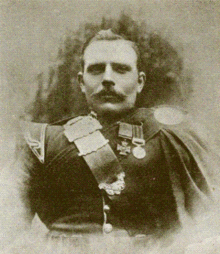George Findlater
| George Frederick Findlater | |
|---|---|
 |
|
| Born | 15 February 1872 Turriff, Aberdeenshire |
| Died | 4 March 1942 (aged 70) Turriff |
| Buried | Forglen Cemetery, near Turriff |
| Allegiance |
|
| Service/branch |
|
| Years of service | 1888–1898 1914–1915 |
| Rank | Sergeant Piper |
| Unit | Gordon Highlanders |
| Battles/wars |
Chitral Expedition Tirah Campaign World War I |
| Awards | Victoria Cross |
Sergeant George Frederick Findlater VC (16 February 1872 – 4 March 1942) was a Scottish soldier in the British Army, who was awarded the Victoria Cross, Britain's highest award for gallantry, for his role in the Tirah Campaign. On 20 October 1897, Findlater, then a junior piper in the Gordon Highlanders, was shot in the feet during an advance against opposing defences at the Battle of the Dargai Heights; unable to walk, and exposed to enemy fire, he continued playing, to encourage the battalion's advance. The event was widely covered in the press, making Findlater a public hero.
After receiving the Victoria Cross, Findlater supplemented his Army pension by performing at music halls, much to the outrage of the military establishment, but after growing scandal he retired to take up farming in Banffshire in 1899. In 1914, he re-enlisted in the Gordon Highlanders for the First World War; he served as the senior piper for the 9th Battalion until the end of 1915, when he returned home because of ill health. Active in a local pipe band, he continued to farm until his death in 1942, aged 70.
Findlater was born in 1872 at Turriff, Aberdeenshire, one of eleven children of Alexander Findlater, a miller, and his wife, Mary Ann Clark. He attended the school in Turriff but left at a young age to work as a farm labourer; under the law then in force, children were permitted to leave school at thirteen. Two months after his sixteenth birthday, on 7 April 1888, he travelled to Aberdeen and enlisted in the 2nd Battalion, Gordon Highlanders. The battalion was posted to Ceylon, where in 1891 he transferred to the 1st Battalion, then serving on the North-West Frontier of British India, now part of Pakistan. He first saw active combat there in March 1895, at the Malakand Pass, where he was hit but not wounded; later in the year, he served with the relief force in the Chitral Expedition.
...
Wikipedia
